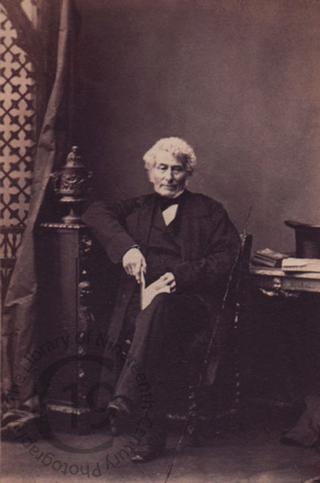
Earl of Ellenborough
A carte-de-visite portrait of the Earl of Ellenborough (1790-1871).
Born on 8 September 1790, Edward Law was the son of the 1st Baron Ellenborough and was educated at Eton and St John’s College, Cambridge. He represented the rotten borough of St Michael's in Cornwall in the House of Commons until 1818, when the death of his father gave him a seat in the House of Lords. He was married twice, but had only one child, who died young; his second wife was the notorious Lady Jane Digby, whom he divorced by act of Parliament in 1830.
He was made Lord Privy Seal in the Duke of Welllington’s government of 1828, and was three times president of the Board of Control. In February 1842 he was appointed to succeed Lord Auckland as Governor-General of India. His Indian administration of two and a half years, or half the usual term of service, was from first to last a subject of hostile criticism. The events chiefly in dispute are his policy towards Afghanistan and the army and captives there, his conquest of Sind, and his campaign in Gwalior. He was recalled in April 1844, with the directors of the East India Company ‘criticizing his overbearing manner, warmongering and theatrical love of display. They were particularly alarmed by his ill-concealed desire to take advantage of the political chaos in the Punjab by launching another war of conquest’ [Saul David, Victoria’s Wars, 2006].
On his return to England, Ellenborough was created an earl and received the thanks of parliament; but his administration soon became the theme of hostile debates, though it was successfully vindicated by Peel and Wellington. When Peel's cabinet was reconstituted in 1846 Ellenborough became First Lord of the Admiralty. In 1858 he took office under Lord Derby as president of the Board of Control, for the fourth time. However, he soon had to resign over a caustic despatch censuring Lord Canning for the Oudh proclamation, which he had allowed to be published in the Times without consulting his colleagues. Though acknowledged to be one of the foremost orators in the House of Lords, and taking a frequent part in debate, he never held office again.
Ellenborough died at his seat, Southam House, near Cheltenham, on 22 December 1871. The barony reverted to his nephew Charles Edmund Law (1820-1890), the earldom becoming extinct.
Photographed by Camille Silvy of London on 13 April 1861.
Code: 124721




